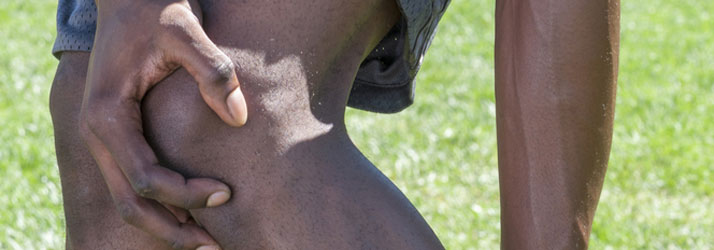Knee Tears in Fort Worth

Knee tear symptoms include a popping sensation, an inability to straighten your leg, and pain. Dr. Mark Williams and the team at Texas Injury Clinic in Fort Worth, TX, can create a custom physical rehabilitation plan to help you find relief without the need for surgery. Studies show that surgical and nonsurgical treatment of knee tears in Fort Worth provide comparable results.
The Anatomy of the Knee in Fort Worth
Four bones meet at the knee joint:
- femur
- fibula
- tibia
- patella (kneecap)
Articular cartilage covers the ends of the tibia and femur, as well as the back of the patella. This tough connective tissue allows smooth movement between the bones at the joint.
The knee joint also has thick rubbery pads of cartilage called the menisci. The inner meniscus (medial) and outer meniscus (lateral) are C-shaped. The menisci rest on top of the thin layer of articular cartilage covering the top of the tibia. Serving as shock absorbers, the menisci absorb impact, stabilize the knee, and facilitate smooth motion.
Causes of Knee Tears
Meniscal tears can occur due to a direct blow to the knee or other sudden and severe injury. Common in sports such as soccer, football, and skiing, a meniscal tear can occur as an athlete forcefully moves while bearing weight on a leg. A football player, for example, may rotate the knee while the foot is planted on the ground when turning to cut around another player.
A meniscal tear can also happen following repeated small injuries to the cartilage. Professions who must squat and kneel repeatedly, such as plumbers and carpet layers, are susceptible to this kind of injury. Aside from work-related injuries, degeneration of the meniscal cartilage can also develop in those with osteoporosis.
Symptoms of a Meniscal Tear
Sudden meniscal tears are immediately noticeable. A popping or snapping sound and sensation will usually accompany an acute tear. Patients who gradually tear their meniscus may not notice it right away, with symptoms slowly becoming more apparent over time.
Signs of a meniscal tear include:
- Losing the ability to fully straighten the leg when sitting or standing (knee locking)
- A popping sensation
- Swelling or stiffness
- Pain with movement
Treating Your Meniscal Tear
The Texas Injury Clinic provides physical rehabilitation as an affordable, safe, and effective alternative to surgical treatment. Our staff will create a custom therapy routine for you that incorporates our state-of-the-art Cybex® equipment. These exercises can strengthen the musculature supporting your knee and encourage the delivery of blood and oxygen to the affected area, promoting healing.
Your treatment plan will depend on the severity and location of your tear. A partial tear will require a less intensive therapy than a complete tear. The outer portion of the meniscus heals faster than the inner portion since it has a richer blood supply. Your medical history, age, and activity level will also be taken into account when creating a treatment plan.
Book an Appointment
Being sidelined from your favorite past times or everyday activities takes a toll on your quality of life. If a meniscal tear has reduced your mobility, give us a call today at (817) 624-7222. You can also send us a message online.
OFFICE HOURS
Monday
8:30am - 6:00pm
Tuesday
8:30am - 6:00pm
Wednesday
8:30am - 6:00pm
Thursday
8:30am - 6:00pm
Friday
8:30am - 4:00pm
Saturday
Closed
Texas Injury Clinic
2121 North Main Street
Fort Worth, TX 76164


